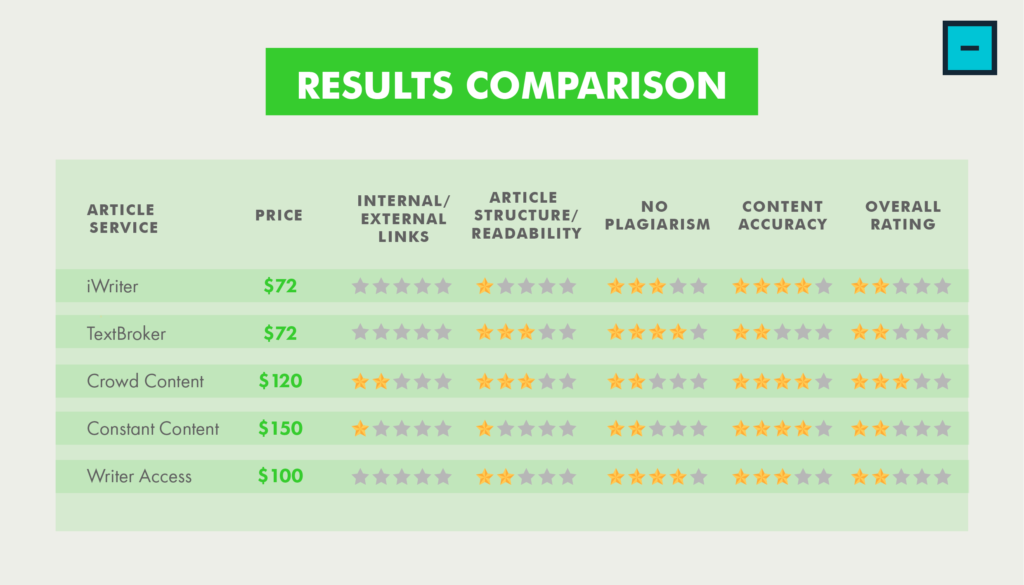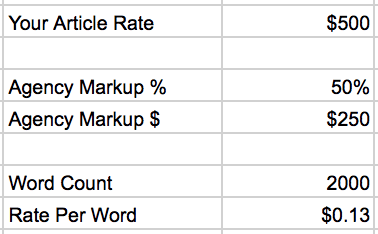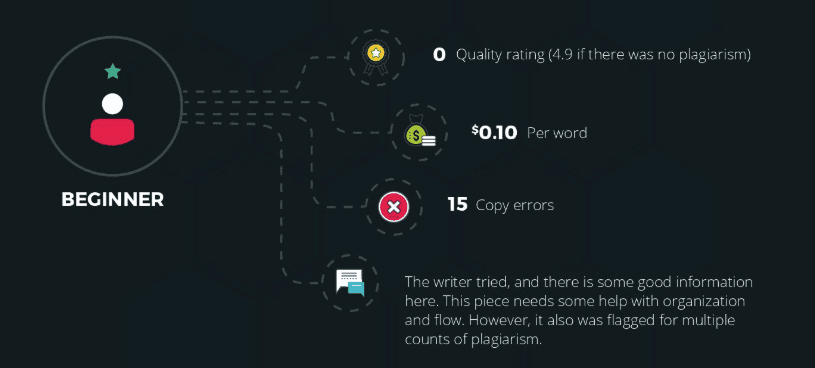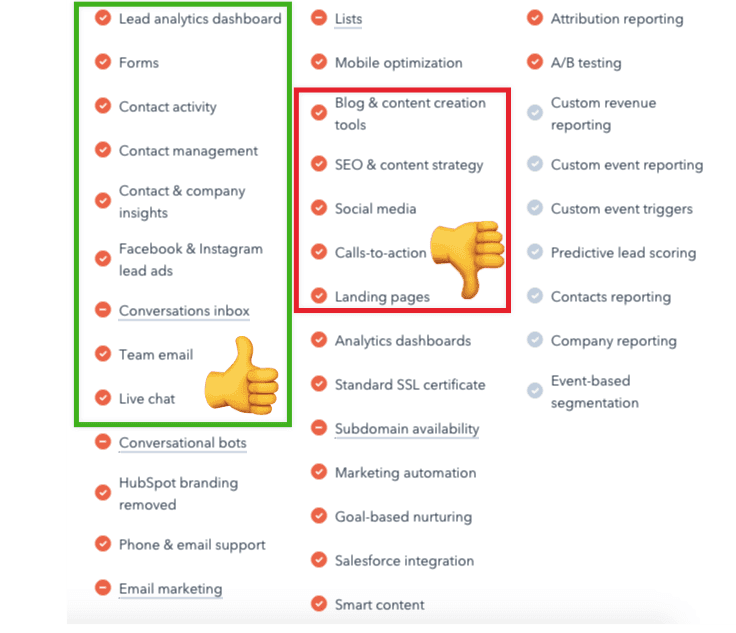Content writing agency pricing seems expensive.
Sticker shock might take a few minutes to wear off.
But working with a content writing agency can be a blessing. Or a curse.
Just like freelance blog writers are ideal in some scenarios, so too are content writing agencies.
The trick, again, is to know where they excel and where they fall short. Not all content writing services and copywriting services are created equal.
Here are the pros and cons of working with a content writing agency. From someone who’s been on both sides of the table.
Scale insightful marketing content across the web.
We help you grow through expertise, strategy, and the best content on the web.
Expertise
Pros: Agencies have more, better writers on staff
The best blog writers for hire usually either come from top-notch copywriters or a content writing agency.

Take this very post as an example.
I’m personally writing it, rather than assigning it to one of our awesome SaaS content writers.
Why?
Our writers are good marketing writers. But what do they know about (a) hiring content writers, (b) scaling content teams, (c) generating marketing ROI, or (d) working with a content writing agency?
Not much.
That’s not their fault, of course. They simply lack the experience to create great content. So assigning them a topic they know nothing about would (1) set them up to fail and (2) result in bad content.
And that’s the problem:
There’s already too much shitty content in the world.
We purchased content from popular content writing services and gave each an overall rating based on different factors. Like article readability, plagiarism, content accuracy.
That sorta thing.
How’d they do?
See for yourself:

Not too great.
That’s a problem when content is a zero-sum game. It means if you hope to get anything — views, awareness, clicks, leads, sales, links, etc. — you need the best stuff possible.
Because anything else won’t get noticed. Harsh, but that’s the reality today.
“The best stuff” comes from subject-matter experts. You know, the ones who actually know what they’re talking about. The ones who’ve spent years developing their knowledge in a particular area.
Most (good) content writing agencies look for them, recruit them, and train them.
And if they don’t currently already have that professional content writing talent in-house or their network, they have the means to hire an experienced content writer with subject-level knowledge.
Working with a content agency can give you access to more expert writers — useful if you have your hands in multiple businesses or have a network of affiliate sites.
That means one agency could potentially handle all your content needs. No need to hire and manage professional content writers yourself.
Cons: They may not specialize in your vertical or content style
SEO has at least 5+ disciplines.
You’ve got technical, analytics, on-page, content, and links/PR.
For now…
With the way the search industry is changing, there will soon be a few more (anything from multilingual to voice search and AI) — more than any SEO content writer can keep up with on their own.
That means even the best content marketers today can’t do it all. You can’t be a 9/10 at every aspect of SEO content writing, unfortunately.
SEO content is simply too broad, too difficult, too complex, and too competitive.
So the next time you see ‘full-service’ digital agency, peep their headcount.
‘Cause when you multiply the fracturing of one discipline across a bunch (like design, dev, CRO, ad buying, social media, email, etc.), you’ll quickly realize that they’ll need ~40+ people to successfully pull any of this off. Minimum.

And if their team is smaller than that?
They’re spreading themselves too thin.
Sure, the work gets done. But overall quality suffers when you have one person doing the job of multiple people.
And that brings us to our first con.
Make sure the content marketing agency in question actually specializes in content marketing and content creation — not just distribution.
They should have some experience with producing SEO content, and know-how for ranking in search engines. (Preferably, the specific kind of content you’re interested in.)
That means the writing agency you work with should have a firm understanding of things like keyword research, content optimization, page structures, etc.
Because if they don’t…
You’ll get back a poorly optimized blog article. Or something that’s been regurgitated from the all crap that’s already out there.
Second, before hiring a professional content writing service, make sure they specialize (or at least can provide) vertical-specific samples. OR, at least, stuff that shows the same underlying principles that could be applied to your vertical.
Because then you’ll have the kind of content that ranks in Google and gets people sharing your stuff.
This is essential for an effective content strategy.
Otherwise? They won’t have the ability to scale content creation, and their content team won’t be experienced enough to justify the higher rates.

Hiring a good writing agency isn’t cheap. So if they do a bunch of things, and “oh yeah, we can do SEO content, too,” you’re probably not going to get the ROI you desire.
If you come across an agency with a small team that does content and Search Engine Optimization and website design and email marketing for a target audience that includes the construction industry and accountants and retail and banking and mortgage brokers and personal finance…
Run and hide.
Or stay.
Your choice.
Scale
Pros: A content writing agency can scale quality content
Agencies build upon what writing services do well, while also raising quality with more experienced and better trained writers.

(That’s how it should work in theory, anyway. But it doesn’t always happen in reality. Read the Cons below to find out why.)
Forget 500-word blog articles.
Long-form content is where it’s at — they rank better in Google, get more social shares, and attract more backlinks.
But here’s the problem:
Writing content takes time.
Writing good content takes even more time.
Even an expert writer still needs to produce a draft, get their resources, make revisions, and optimize their content.
Which means…
A freelance content writer can produce 1 to 4 pieces of content a week for you. That’s good enough for some. But not for others.
A content writing agency is able to bring an in-house team of writers to scale content creation to infinite heights. All while producing higher-quality work, more consistently, in the same style and tone.
A few months ago, we had a new client start with five articles. When that went well, we bumped up to 15/month. Month three? 50+ — all 2,500 words and up, with a dedicated team of three experienced writers and an editor.
Working with freelancers, as an alternative, means you’re getting several different styles with several different tones. Getting them all to speak the same brand voice for website content writing is a challenge.
When collaborating with freelancers, integrating their diverse range of freelance ideas into a cohesive brand voice presents its own set of challenges. Each freelancer brings a unique perspective, writing style, and tone to the table, which can enrich the content but also requires careful coordination to ensure consistency across all pieces
But there’s one last pro tip to keep in mind with content writing agencies: Find out if they work with in-house or contract writers.
Here’s why:
Cons: They’ll be using in-house writers to mark-up costs
In-house writers typically receive better training and produce faster turnarounds, so the writing agency (should) have more time to review internally for content quality before it gets to you.
They should also have familiarity with on-page SEO, which is essential to rank at the top of the search engine results.
Because if your content is anywhere else, your content won’t get noticed.
Don’t believe me?
Just take a look at these organic click-through rates on Google by position:

The top positions attract a majority of all search clicks, while the results on the bottom barely get any clicks.
Working with an agency that has SEO experience means you could grab more top rankings with content they produce for your business.
Awesome contractors are great. But the problem with scaling content through them comes down to simple math.
Most good freelance blog writers rightfully charge as much per piece as possible, so they can reduce their overall workload to make a certain amount each year.
But the content agency needs to mark up their cost to account for all the content editing, project management, and other costs associated with each client.

That usually results in agencies having to find the cheapest content writers possible, instead of the best ones for the job. Otherwise, they won’t make any money.
I’ve personally made this mistake and regret it to this day. But it’s also a reason why I don’t think clients should try to get the cheapest possible price for something (an article for another day).
ClearVoice’s excellent survey found a correlation between the following experience and writing rates:
- Beginner: $0.10 per word ($200 for a 2,000 word post)
- Pro: $0.25 per word ($500 for a 2,000 word post)
- Expert: $0.75 per word ($1500 for a 2,000 word post)
Notice those costs. It means the agency is ONLY able to use beginners. Even though you, the client, might be paying for Expert-level rates. Otherwise, they’ll never, ever break even.
And the problem is that content writers in the Beginner category also have the most issues, mistakes, and plagiarism.

Which means you’ll have to spend time reviewing that piece of content, fixing up any mistakes, and checking for plagiarism.
So, once again, the extra cost isn’t worth it.
Working with an in-house team of writers, on the other hand, means you can give out a bigger annual salary, plus benefits, etc., while still reducing the internal cost per piece, so that clients get better work, faster. Additionally, investing in efficient payroll software can streamline payroll processes, ensuring that your in-house team is compensated accurately and on time.
Timing
Pros: Agencies should be able to turn content around quickly
Turnaround time is a direct result of capacity.

If a freelancer has too much work, your stuff gets pushed to the bottom of the queue. The better they are, the more work they have, and the less they need your new work.
If their capacity is overloaded, because they’re taking on more work than they can handle, it also affects content quality.
So now you’re fighting a battle on two fronts.
We work on a ~7-day production scheduled internally, for instance. But we tell clients to expect content within ~10-14 days.
That gives us a few extra days, if needed, to cycle the content back and forth, from editor to writer, to make sure that we’re producing quality content.
You don’t often get that luxury with contractors, because (1) quality is less consistent and (2) turnarounds are much slower.
Many contractors we’ve worked with require at least 7-14 days notice on any new work. Those long turnarounds are understandable from their point of view. But it means we’d need to get at least ~30+ days of content ideas from clients to be able to schedule everything out in time.
I <3 our clients, but most don’t have content calendars let alone topics planned 60-90 days out.
Whereas with in-house writers, we can juggle their assignments and give them something new same-day if needed.
Cons: They need to balance capacity
How, exactly, do we give in-house content writers new assignments on the same day?
What happened to their old, existing assignments?
We bump them back.
Usually, because:
- We like the client more, or
- They pay more.
Simple as that.
Otherwise, turnaround times start to break down when someone’s trying to fix old work, and start new work at the same time.
Writing, as a verb, is a finite resource. You can do it a few hours a day. But not all day, every day.
So it’s not as simple as telling a writer to work 100-hours a week. It’s just not going to happen. Instead, it’s usually a question of prioritization. One vs. the other.
Agencies (should) have the internal capacity to move things around last minute without the client experiencing a major delay. Like this Slack message I posted a few weeks ago:

We can pump out a new article in 48 hours if needed. But it means we need to move stuff off someone’s desk, assign it to another, and update the turnarounds accordingly.
Individual writers, or teams of freelancers, don’t have this luxury. They don’t have this coordination or ability to move things, accommodating faster turnarounds or last-second requests, without jeopardizing future work.
Management
Pros: Your end result should be better because you’re working with a team
You’re not just paying for a writer to write with an agency.
You’re not just getting a single contractor with one skill set.
Instead, you’re paying for an entire infrastructure to make sure your stuff is consistently better.

We have 4-5 people touch every single article before it goes to a client.
That means from beginning to end, we have an operations manager, writer, senior editor, copy editor, and director of operations overseeing the entire process.

It might take a few weeks to get on the same page with each client’s style.
Content is subjective after all. Engaging content is based on personal preferences. But after a bedding-in period, they should be able to produce more, better, faster content because there’s no single point of failure.
You also get internal Quality Control to make sure everything you receive is consistent with your style guidelines and free of errors or plagiarism.
Plus, they can help with their content marketing strategy and any other related service to make sure you get publish-ready stuff, significantly bringing down your time to manage the process.
Cons: You need to agree on a balance between production and ancillary services
What you see is what you get with most content creators.
You pay $500 for a post.
They get to work.
And you get a post.
Nothing less, nothing more.
That’s great if you can handle the rest. If you can handle the keyword research, topic creation, CMS upload, on-site optimization, and the other details that make up good content writing.
However, with agencies or a content writing company, make sure to double-check production vs. ‘stuff.’
If the starting price is $5k+/month, but the number of monthly content pieces you’re getting equals only two, it means your budget is being eaten up by strategy, research, optimization, distribution, and reporting.
That could be good if you need the help. Or it could be bad if you already have those things taken care of internally, or with another vendor.
It’s like HubSpot. Awesome company. Cool software. But if you’re not using half the features, is it still worth the $10k+ annual price tag?

To someone? Yeah, of course.
To you? Perhaps not.
Conclusion
A content writing agency should be able to produce more content, of a higher-quality, faster, for far less than it’d cost bringing it all in-house.
That’s how it should work in theory, anyway.
But it’s not always what plays out in reality.
If your marketing strategy includes having original content, then professional content writing services can be an option. Professional content writers are one of the best-kept secrets for effective digital marketing.
The key is to hire a content writing agency for your website content for all the pros listed above, after carefully navigating all the cons that can come with it.
Interested in working with our agency?
We follow a proven process that allows us to produce over 250 high quality pieces each month for our clients.
Get an instant quote now using our online calculator. It takes less than a minute to fill out.



